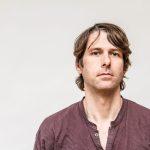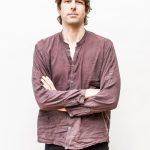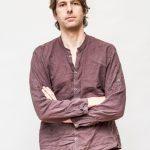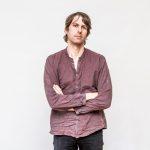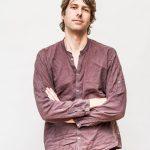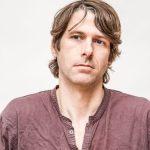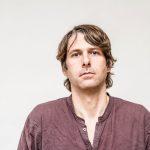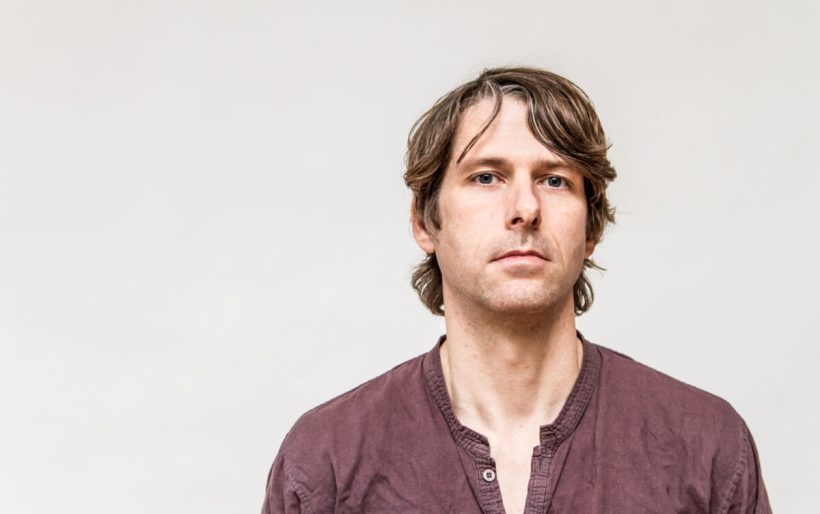
Chris Smith | photo by Josh Pelta-Heller for WXPN
The High Key Portrait Series: Chris Smith
“High Key” is a series of profiles conceived with the intent to tell the story of Philly’s diverse musical legacy by spotlighting individual artists in portrait photography, as well as with an interview focusing on the artist’s experience living, creating, and performing in this city. “High Key” will be featured in biweekly installments, as the series seeks to spotlight artists both individually and within the context of his or her respective group or artistic collective.
When you speak with Chris Smith, you don’t get the impression that it’s a nervous energy, so much, that drives the discursive discourse — or even that the discursiveness is necessarily a negative quality, in his case. Rather, you immediately understand that he just has so much to say about all of his rich experiences, that he’s thought so deeply about it all: from the city streets he’s stomped for his decades living here, to the venues he’s played, the neighborhoods he’s called home, and most of all to the expansive community of musicians and artists and friends that he clearly feels so fortunate to have.
Smith is a veritable encyclopedia of music knowledge — for all music, sure, in the way you might expect or hope any passionate musician to be — but specifically and profoundly for Philly’s scene. He can’t seem to be able to say enough in his adoration for what this city’s managed to cultivate, over the past twenty years and even earlier, and parts of the conversation can begin to trend toward extemporaneous encomium.
But although the multi-instrumentalist’s psych-folk outfit Espers were a beloved staple of Philly indie music back in their heyday, some 15 years ago now — back in the days when he wore his straight hair a lot longer — you don’t catch Smith dwelling much on that, beyond a passing reference, even if you might have hoped for a tale or two. In fact, he never even really references or plugs his own band’s really remarkable catalog and achievements at all, but instead directs almost of all of his acclaim outwards. From his accounts, you end up with a much broader picture of a reverie that wanders between the actual brick-and-mortar record stores of South Street record stores, through recurrent Philly occasions like First Fridays, his exploits and encounters with local artists and poets, and into a cheap rental property in the mid-’90s with his indie-rock compatriot Steve Gunn for a snapshot of the sometimes-controversial revitalization the Northern Liberties. And on top of all that, Smith is uniquely poised to be able to offer both an insider’s and outsider’s perspective on the Philly’s arts culture, as well as both a successful musician’s and a successful indie-record-label-owner’s perspectives on how to enable yourself to be both — even in a place that artists can sometimes have the tendency to malign as unconducive to that sort of professional growth.
At one point in this interview, after all of that, Smith catches himself, and feels the need to advise you that he’s not usually an unbridled optimist, lest you begin to feel your Philly-stiffened upper lip start to soften on the spot from all of his exuberance. Frankly, you really don’t buy his reminder.
Still kicking around in Philly, Smith is mostly focused these days on continuing to build remotely his record label, Paradise of Bachelors, based outside of Durham, NC, in partnership with co-founder and Carolina counterpart Brendan Greaves. The label has been blowing up lately, most recently offering new releases from The Weather Station and Gun Outfit — not to mention this fantastic and seasonally relevant sci-fi literature review. ”Paradise of Bachelors,” declares Smith after the interview ends, “Just check it out!” True to form, he adds after a short pause, “That’s about it . . . I’m so bad at plugging myself.”
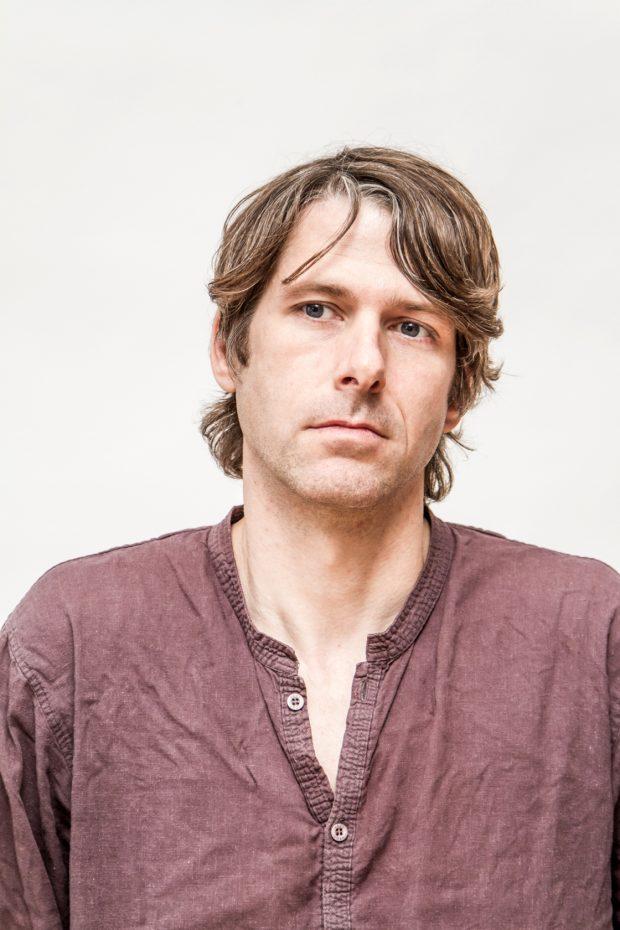
Chris Smith | photo by Josh Pelta-Heller for WXPN
THE KEY: Are you a Philly transplant, or born here?
CHRIS SMITH: I was born here, I grew up in Lansdowne, right outside of West Philadelphia.
TK: You went to high school out there?
CS: No I went to high school at 17th and Girard, at St. Joe’s Prep.
TK: What do you remember from high school?
CS: I remember a lot, I remember taking the train — as soon as I started coming into the city for high school it kind of changed my life. That was my high school experience, was kind of like, South Street, the Philadelphia Record Exchange. I entered high school heavy into music — my father was a musician and a record collector, so, it just opened up more for me to explore. So yeah just like meeting other people, other little skate punks and the like, the “alternative” crowd on South Street and just hanging out, finding more stuff out.
TK: How did you first get connected to the Philly music scene?
CS: Well you know in high school, high school bands, meeting kids from other schools with bands. But that’s so young. And right when I started high school I met Joey Sweeney — he was a senior when I was a freshman, and we became friends. But you know, in high school that generation is huge, whereas when you get older it isn’t, you know, the three or four years. And then he graduated and I didn’t really see him. And then when I started Temple, he had transferred out of — I forget where — but he started at Temple as well. And we would attend the same orientation. So we just reconnected, and I just started hanging out with him a lot when I was like 18. And he introduced me to Kurt Heasley of the Lilys — who became a dear friend of mine, still is — Kyle Andrews — who’s like a local Philly legend, most people know him, he’s not in bands — those guys just turned me on. As soon as I graduated high school I moved out of my parents’ house into a house in West Philly full of other musicians and just got like really heavy into whatever was going on. I got really into jazz and Middle Eastern music at that point, it was like ‘93.
TK: Local jazz?
CS: Yeah! Well of course Sun Ra — that starts everything. But there was a lotta stuff going on in New York. I lived with all these older guys that were like heavy music heads, and they were just laying things on me left and right. And you know Tom Lax was here running Siltbreeze [Records], and I became friendly with him, and he was just channeling all the great stuff from New Zealand — The Dead C. So it was just this super quick education, and it just never stopped.
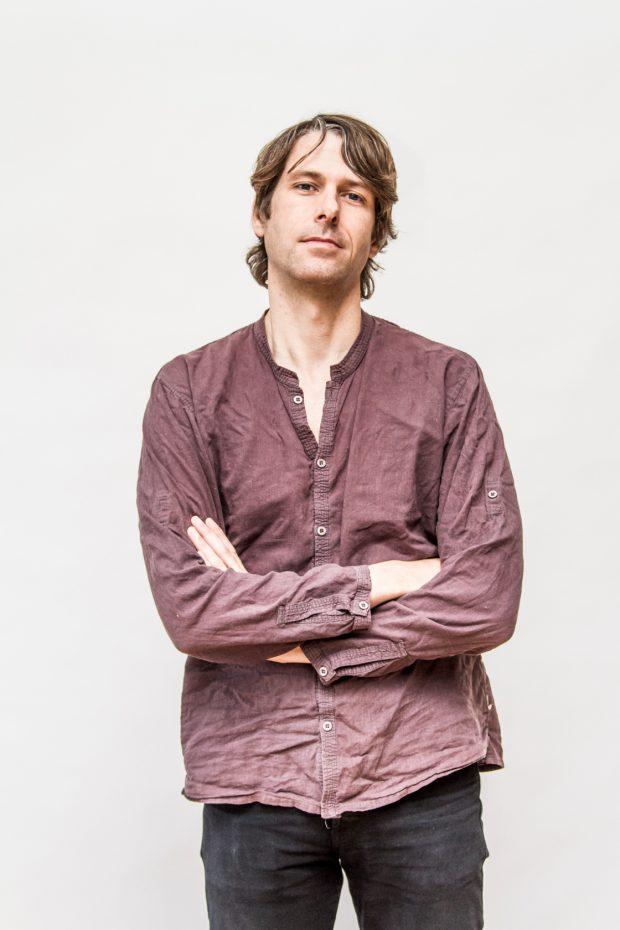
Chris Smith | photo by Josh Pelta-Heller for WXPN
TK: Who’s your favorite Philadelphia artist, or which artist influenced you most?
CS: Hmm, that’s a hard one — probably The Lilys? You know, ‘cause I was kind of in awe of Kurt, and he was also my friend. And I wasn’t really playing music at that point, and I wanted to, and he was always encouraging. A couple years after that as I got older, there was a great band called Un — they were all these friends of mine from West Philadelphia. Un was huge, for me. There were just so many great bands. A whole plethora of them. But let’s just stick with those, for now.
TK: Where did you play your first show in Philly, and what do you remember about that night?
CS: Well when I was in my early 20’s I started playing guitar. I hung out a lot in the art scene too — I still do. And so, I did a set of performances — one with an artist named Martha McDonald, and another with a poet named Joe Shahadi. I can’t remember if it was a First Friday, I think it was part of the Fringe Fest. I was playing this kind of improved acoustic-guitar stuff — in fact I was ripping off Sun City Girls: there was a riff on “Blue Mamba,” and I was kind of doing a bastardized version of that, because I couldn’t play it like RIck Bishop could — and I remember it feeling like, ‘oh no, everybody’s gonna know that I can’t play guitar!’ [laughs] And of course nobody’s paying attention to me. I just remember feeling really exposed and nervous, and kind of like a fraud. [laughs] Which I still feel, every time I play music in front of anybody. [laughs] It was somewhere in Old City, it was part of like one of the Fringe Festival things — I think we were just like walking around doing it, out in the street.
TK: Which Philly venue is your favorite to play at?
CS: I’ll probably just go with the default of Johnny Brenda’s, because my friends own it. My friends work there, it’s a few blocks from my house. It’s just easy to do. Espers played a show at the [Franklin Institute’s] planetarium — that’s not a venue but it was probably my favorite place to play. That was really fun. In terms of like standard venues, I’ll just phone it in and say Johnny Brenda’s. In terms of like ‘wow — that was really cool…,’ the planetarium.
TK: What do you love most about the Philly arts scene?
CS: Well I like that Philly has a chip on its shoulder — it always has and probably always will, I don’t think we’ll evolve out of that. And people wax poetic about why — you know, like, ‘New York’s so close,’ or whatever — but I love it. I think it creates a healthy competition. A sense of begrudging support — like true support, but then there’s also this begrudging support — that just keeps on fostering people to keep on supporting and competing in a healthy, symbiotic way. I think Philadelphia musicians and artists make very honest work. I think there’s a prolific nature here. You’ll see a lotta people particularly in a fine arts student community display work immediately. Some people would say ‘you know you should be more curatorial about what you display,’ but I really like the energy of just throwing things out there, I think it evolves a very unique type of artist and a refinement — I mean it happens in other cities and other scenes, this is just where I live — I like the refinement that it lends. It’s a real — I hate to use the word “gritty” and all that stuff — but it’s a real gritty approach to elegance, and I really like that.
TK: When you say “begrudging,” can you elaborate how you mean that?
CS: Well you know, at least in my realm, of friends, people always say ‘Philadelphia Eats Its Own.’ But that’s too easy to say. People will always shoot themselves in the foot. They’ll say, ‘so-and-so’s doing well. [grrr] I liked them before..” So the idea is like, ‘Philadelphia is jealous,’ or we’ll have this little stepbrother thing with New York. And that may be, but I think when people’s voice will sound begrudging, or salty or whatever — I think it’s actually like a weird form of high praise. It’s like ‘Man I wanna do that,’ and not only do I wanna do that, I can do that. Because somebody I’ve been having a beer with for five years just worked his or her ass off, and it worked for them, you know what I mean? So there’s this kind of like stoic, it might sound begrudging but you know, maybe it isn’t really, internally. It’s nice. I know it doesn’t sound like what I’m saying is nice. But I think it is.
You know, I’m 42 years old. At least when I was in my 20’s and wanted this, or wanted to do this, you looked at it and you had no idea how much work it took. You thought it would just happen. You thought, ‘I’m talented. I’m smart. I can do this and it’ll happen.’ And then everyday you get older you realize, well that’s not true, it’s work work work. And then you hit that crossroads: ‘am I lazy, or am I not? Am I gonna keep doing this, or am I not?’ And when you see that guy or that girl make it, and then you realize that ‘well wait a second, man — in my mental Rolodex I can go back like seven years I’ve seen that person — ‘shit, yeah they’ve always been working their ass off!’ Y’know, I just think it shows, like, you just gotta work work work work work. And people in Philly work. It doesn’t come easy. Like Kurt Vile — he didn’t wake up one day and just do great. War On Drugs, these bands, it didn’t just happen. These guys worked. They put their time in, they did not mess around.
TK: It’s funny, I mean some of these bands that come out sometimes, it’s easy to think it did just happen overnight. When you say that, who were you thinking of, when you were coming up and thinking these people made it but they were working hard that whole time?
CS: Hmm, let me think, when I was younger. You know that’s a good question — when I was younger I was so into underground music, that I wasn’t paying attention, to be honest with you. To me, like, “making it” was the antithesis of what I was into. I didn’t really kinda give up that ghost until I matured a little bit, frankly until I was into my mid- to late-20’s. So that’s a hard question to answer. I didn’t have that kind of star envy. But you know, like, Kurt — Kurt to me was like, ‘wow, Kurt made it!’ You know, he had a video on MTV — not that I even cared about that — but I thought it was cool that my weird friend, that I looked up to, was like making music and touring the world on that level.
When I was really young I became friends with the band Stereolab. You know, it felt like it was “our thing.” I met them and, they kinda blew up and I thought that was really cool. But they’re not from Philly — from Philly I guess I’ll have to go back to Kurt and The Lilys. And, I don’t know if they ever actually “made it,” or anything, but I was buddies and I hung around with, when I was really young, the guys in that band The Goats, the rap band. In my 21-year-old brain, they made it. I thought that was really cool, you know. I never was heavy into rap, but I thought that was really cool and I really liked those guys.
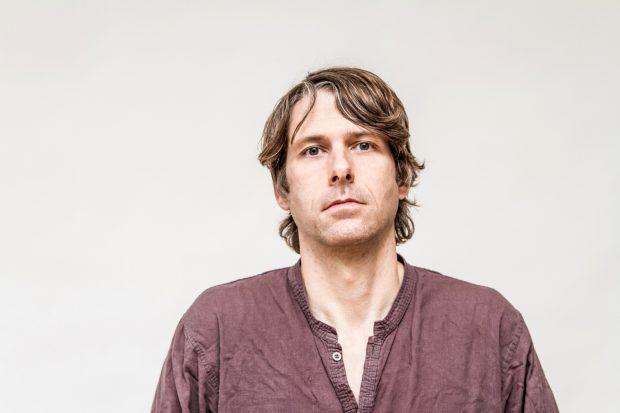
Chris Smith | photo by Josh Pelta-Heller for WXPN
TK: What do you find most frustrating about trying to create in Philly?
CS: You know I don’t know if I find much frustrating. For me, I happen to have this cool little pocket. I guess one thing that’s frustrating: a lot of my friends — myself included — are so comfy. I see a lot of potential. I see as we get older things that you can maybe make a living — I don’t even wanna say a “living.” I like to say your art can sustain itself, i.e., you can kind of get to the point where it’s not your job, but at least what you’re doing, your art doesn’t cost you money anymore, and I see that potential. And one thing that frustrates me is I have a lot of friends who just don’t care about that or don’t go that extra mile. But I don’t know if that’s Philly-centric. I mean honestly, I think Philadelphia’s a great place to live and make art. I mean, maybe I’m the boring guy. And I’m not like some guy who’s like constantly positive about everything. I have opinions, you know. But all that aside, I don’t think there’s really anything in your way in Philadelphia. If there’s anything in your way in Philadelphia, it’s gonna be yourself. There are affordable studios here to make music… you can work with like, Jeff Ziegler… It’s unreal the amount of people that will work with you here, and that are so reasonable, so supportive, incredible artists, incredible musicians that come together and play. The only person that’s gonna get in your way in Philadelphia is you. And you know there’s a lot of small labels based out of Philadelphia, just a lot of work that can be done.
And vice versa — I mean yeah this is all different now but, there’ll be another place — but you know, fifteen years ago, twenty years ago when I moved up [to Fishtown], you could rent a studio for a hundred bucks a month! Like there’s so much space to have a studio in, be it to paint in, to play music. I mean, it’s a real good place to live relatively inexpensively and make music, and make art, and do whatever you want. I think it’s just self-attitude.
TK: I think a lot of artists can feel like there’s no infrastructure here, no machine to help you promote.
CS: Well yeah, but you gotta do it yourself! So yeah, you could say that to me and I would say yes, you are right. But since I’ve been on both sides, I’ve released records as a band, and now I release records as a label. And my label’s grown, you know, and my artists are doing really well. If you’ve got a computer, or access to a computer, you can do all of that. I mean there’s no door that you go and knock, up on Girard Avenue and say, ‘they won’t let me in! The Marketing Door won’t let me in or the PR door won’t let me in!’ That just doesn’t happen. If you make honest music, and you spread it around and get people to listen to it, it’ll work out! (I don’t like to say “good,” because what’s that mean…) But yeah, I don’t think Philadelphia’s lacking any of that. And again, that gets back to saying, it’s a hard world out there. Making music is harsh now, having done it for twenty years. But it’s also easier to approach things that weren’t easy to find out how to approach twenty years ago. So again, it’s self-attitude. I mean, you can find it. There’s a lotta bands. There’s a lotta bands, and there’s not that many more labels, or publicists or managers. So, the labels/publishers/managers, the people working that stuff, you know, they’re getting just hit with so much more content. So I guess that might be what people feel frustration about. But that’s not just Philadelphia-based, that’s anywhere you go.
TK: So having done this from both sides then, is there anything specifically that you like or dislike about it from the promotion side as well?
CS: Philadelphia’s a stubborn city. I always felt that. I mean I don’t like to generalize anything, but in my experience it’s stubborn. Even in my group — my group of best friends are the sweetest, best human beings in the world, and some of my favorite artists — but man I feel like sometimes it’s like pushing a huge boulder uphill just to be like, ‘just shut up and listen! Whatever your preconceived notions of this is, you know, just chill.’ I think that “underdog” thing makes people stubborn or suspicious of things coming up — but that’s such a generalization. That’s more like, when I say that, I feel like I’m in a sketch comedy. So I feel like I’m saying that to you, but then I wanna say like, ‘but that’s if you and I made a sitcom about it!,’ you know what I mean? That’s not real life, you know what I mean.
I sometimes feel like it’s a challenge to do that. For instance, I have bands [on Paradise of Bachelors] coming through all the time. I have bands from Los Angeles, Toronto, you know, and the bands that are younger that were developing or trying to really get a crowd, you really want your friends to come out for the show, and you might feel frustrated that they don’t. Yet your other friend’s band that plays the same damn show every two weeks, it’s like everybody’ll go to that. It’s like a sheep thing. So that can be frustrating. But again I don’t think that’s local to Philadelphia. The flip thing — the thing that’s great about Philadelphia — is the exact opposite of that: these same groups of people, I can get people out to a show like crazy! I can spread enthusiasm really well! So it’s just a weird place.
I’ll tell you one thing man, I’ve noticed this: If you get fans in Philadelphia, from a music standpoint, you have ‘em. They are here. And it’s awesome. If you earn that — and I don’t even know how you earn it. First you gotta be good — or whatever that version of “good” is to those people. But when you obtain them, man they are loyal, and on your side. And that’s pretty cool.
TK: Have you found that to be in contrast to other places?
CS: Well, yeah. I mean, music — indie rock, or whatever you wanna call that stuff, underground — is a very fickle place. There’s a lot of general malcontent about it. You can’t say the word “Pitchfork” without a whole bunch of snark. You know the whole world is snarky toward that, there’s a lotta suspicion. So I feel like you can get that elsewhere, but I do feel like Philadelphia, since it is such a hardscrabble vibe that permeates, a kind of “underdog” vibe, that there is a unique loyalty here. I spent a lot of time in Los Angeles and New York, and it’s great, there’s a lot of loyal kids there too, but that’s just a whole other animal. Philadelphia is much smaller, even though we’re not “that much smaller,” we’re so much smaller. Things spread quickly here.
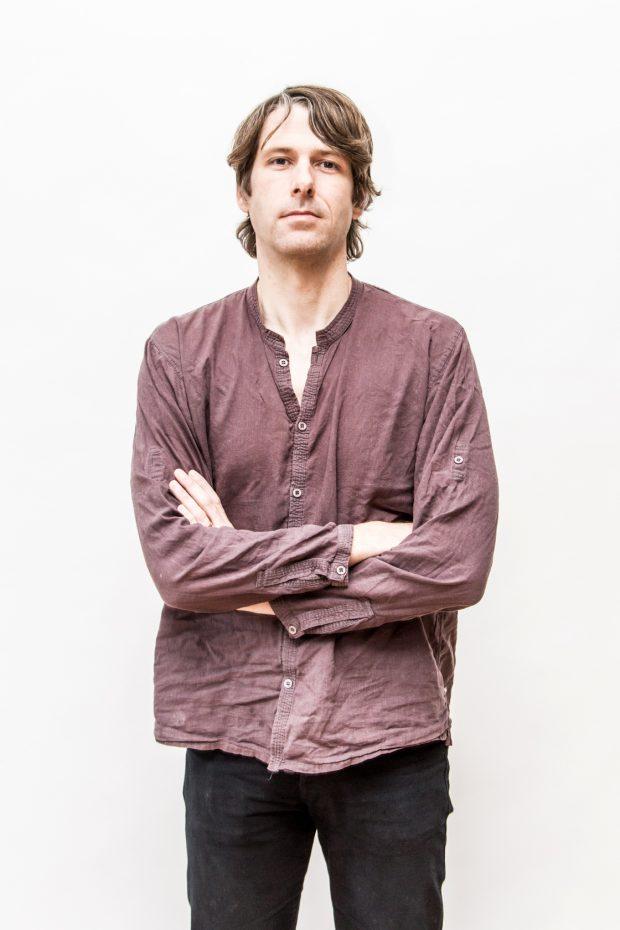
Chris Smith | photo by Josh Pelta-Heller for WXPN
TK: Which Philly neighborhoods have you lived in, and which did you love or which made you wanna bail?
CS: West Philly I lived in for two years, til I was 20 and I wanted to bail — I wanted outta here, I wanted to go to New York!
TK: You wanted out of the city altogether?
CS: Yeah. But I was also, you know, that age, around 20-ish, and just not knowing what I was doing with my life. I returned to graduate, but I had stopped going to school, I was working, I would go travel in Europe and come back, and I just hated being here, you know? And when I went back to school to finish out — myself, the artist Anthony Campuzano, and then Steve Gunn — we moved from West Philly to Northern Liberties in maybe 1997, it was early! And we loved it. It was like wow, Steve and I were so happy to be out of West Philadelphia. We were really young, we felt like it was “hip” to be there — but Northern Liberties was what Kensington is now; there was nothing there. We moved up there like a year before the 700 Club opened. We met all these cool other people and yeah, I really fell in love with Northern Liberties. And then I moved to Fishtown in 1999. Like any human being, something bugs me out and I wanna get outta here.
But it was around the early 2000’s that Espers came to be, and that whole thing was going on — Fursaxa was here, Jack Rose lived here — and, that was when I was like, man, I don’t wanna get outta here at all.
TK: So you’ve lived here [in Fishtown] for about 16 years — how have you seen it evolve in that time?
CS: I think if we were to do a, like, “better or worse” list, it would just balance out. It’s all a matter of taste. For me, it’s harder for me to park, I can’t stand it, it sucks — but, my property value went up, I bought my house ten years ago, so better. But no — that’s the old dude, thinking about money. Money and convenience! [laughs]
But in terms of culturally, I love how serious Philadelphia’s taken. I go to lot of conferences — music stuff, I’m traveling all the time — and there’s a lotta respect. There’s a respect for our well-known bands — The War On Drugs, Kurt — like those guys, they’re my friends. It’s SO SWEET to see that. You know and they’re on such a different level. But then people who are like into records, into serious music — they know who Birds Of Maya are, they know who Purling Hiss are — there’s a heavy-duty, deep respect for the Philadelphia underground. Like we have a proper underground here, like a proper weirdo scene here and like, it’s known. It’s known all over the world. And respected hardcore, I mean truly, truly respected. And I think that, all of the corny stuff — the “sixth borough,” all the goofy shit you see about us, and all the ugly houses you see getting built, and the condos or whatever — for every one of those, there’s another set of eyes on the area, on Philadelphia. And when you have this tangentially exploding set of eyes, not all of them are just hungry, weird developers. Some people are like ‘wow that’s neat, that’s cool, I dig what’s going on!,’ and they wanna hear about it. And I meet those people.
A friend of mine opened up for the band Destroyer — and she’s really sweet, her name is Jennifer Castle — and I met her bass player, and we were just sitting there, all of us were talking, and he said the words, “Willie Lane.” Willie Lane is a dear friend of mine, and one of the best guitar players I know. He doesn’t live in Philadelphia anymore but he did for years — but he’s about as underground-weird-guitar-player as it gets, and this dude from Canada like invoked the name Willie Lane, you know? That happens. You know, like a session bass player from Toronto — that’s so cool! I think that’s just great.
TK: Are you a Philly sports fan? I got a couple novelty questions for the “born-and-raised” folks: 1980 or 2008 Phils?
CS: Oh I am. And I can’t pick one over the other! You know, I was like 5, when they won the World Series in 1980 and I remember it. Like I remember that happening, that is like such a crystallized look, feel.. cigarettes, I can taste it.. I can taste and smell what that was. But you know — I’m gonna say 2008. Because 2008 a real hard time, for me personally, that area. I split up with a woman — and don’t worry, I’m not getting dark here — so that was a time when the strength of my community, my friends… I already knew it, but they were really coming through for me. And we were all watching the Phils, and that was great. And you know, Jack Rose died shortly thereafter, and that’s a fond memory for me. I mean he would die a year later, but, I feel that was the beginning of this last glowing, beautiful year with Jack — so much of it was based on watching the Phillies and listening to records and just drinking a lot of beer. So it’s gonna be 2008.
- Chris Smith | photo by Josh Pelta-Heller for WXPN
- Chris Smith | photo by Josh Pelta-Heller for WXPN
- Chris Smith | photo by Josh Pelta-Heller for WXPN
- Chris Smith | photo by Josh Pelta-Heller for WXPN
- Chris Smith | photo by Josh Pelta-Heller for WXPN
- Chris Smith | photo by Josh Pelta-Heller for WXPN
- Chris Smith | photo by Josh Pelta-Heller for WXPN
